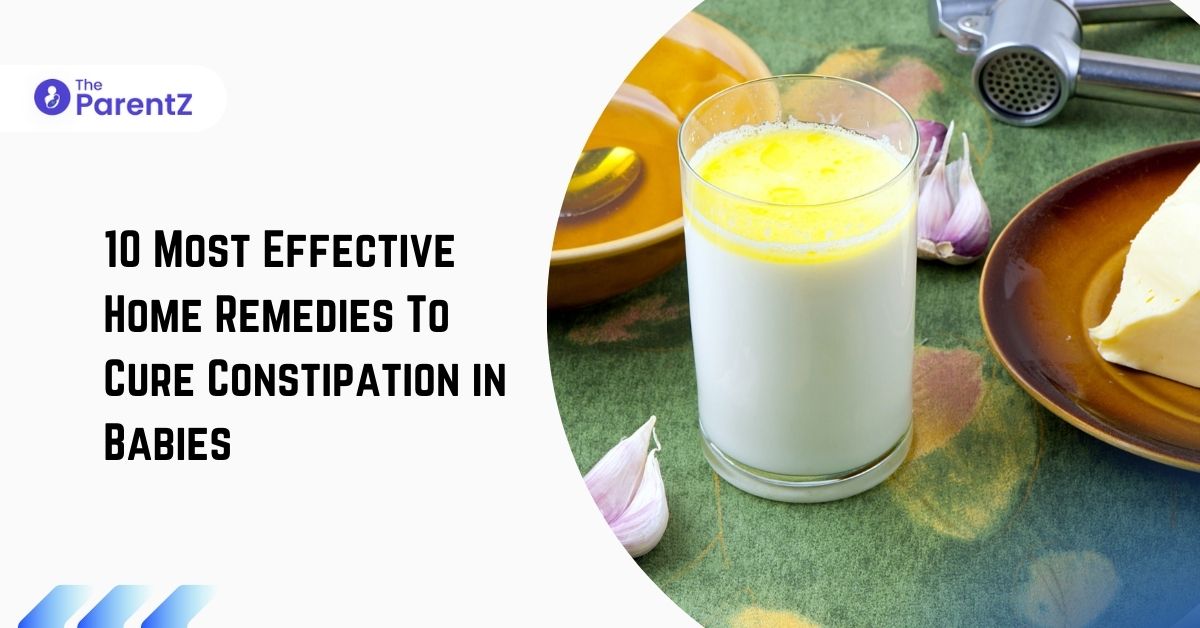Although bowel movements vary from child to child, infants pass stool once or twice a day, but sometimes they can go a few days without any bowel movement. Since a baby’s abdominal muscles are weak, they often find it hard to pass stools. You might have noticed your baby’s face turning red when trying to pass stools, but that doesn’t necessarily mean that your baby is constipated.
Constipation is a common problem in babies. Let’s look at some of the most common symptoms of constipation in babies:
- Being extremely fussy
- Spitting up more than usual
- Difficulty passing stools
- Dry and hard stools
- Belly pain and bloating
- No bowel movement for more than a week
Home Remedies For Constipation In Babies (0-12 Months)
Once you have established that your child has constipation, let us look at the safest home remedies to cure constipation in kids:
1. Massage (0+ Months)
We have all heard of the numerous benefits of massages for a baby. It relaxes your baby and reduces his crying; it aids in digestion and also helps in daily weight gain. Gently massage your baby’s stomach with the tip of your fingers in a clockwise motion. This will help in relieving your baby of colic, reduce pain and discomfort, and increase the frequency of bowel movements.
2. Water (6+ Months)
As water keeps the body hydrated, it also helps in making stools pass easier. Give your child enough water throughout the day to promote regularity and prevent constipation in the future.
3. Breastfeeding (0+ Months)
For babies under 6 months, breast milk is the best food you can provide to cure constipation in babies. Skip formula or cow’s milk as much as you can during this time as they are harder to digest.
4. Lemon (7+ Months)
One of the best ways to treat constipation in babies is by giving them some lemon juice. Lemons are a rich source of Vitamin C, and it helps in pulling water into the gut. The more water there is in the gut, the softer the stools become. This, in turn, triggers healthy bowel movements.
5. A Warm Bath (0+ Months)
If your baby is suffering from constipation, a warm bath might be exactly what he needs. A warm bath can relax his abdominal muscles and relieve the straining. It can also help reduce the discomfort that comes with constipation.
6. Fiber-rich food (6+ Months)
Include fibrous foods like spinach, sweet potato, broccoli, lentils, apples, and oranges in your child’s diet to treat constipation. Consuming fiber-rich food is a healthy and safe way to aid bowel movements.
7. Physical Activity (0+ Months)
Lack of any physical movement also leads to constipation in babies, and exercise helps in stimulating a baby’s bowel movements. Babies who are not able to crawl or walk should be aided by the parents or the caregiver. Lay your baby on his back while massaging him and move his legs around as though he is riding a bicycle.
8. Asafoetida/ Heeng (6+ Months)
Heeng, a spice used in most Indian households, is not only known for its unique taste but also for having laxative properties. Take some heeng powder and gently massage it on your baby’s stomach to help reduce the symptoms of constipation.
9. Ginger (8+ Months)
Another easy way to treat constipation in babies is by giving them some ginger. Ginger has historically been known for its healing properties, especially when it comes to digestive ailments. It cures not only constipation but also indigestion and bloating. Boil a few shreds of ginger with water. Once boiled, filter the ginger shreds and let the mixture cool down. Feed a few spoons of this liquid to your baby.
10. Dalia (8+ Months)
We enjoy having Dalia for our morning meals, and it is also a safe food for your baby. It is an excellent source of dietary fiber, which helps in preventing and also treating constipation in babies. Give your baby a small bowl of Dalia kheer or Dalia khichdi to treat constipation.





Be the first one to comment on this story.